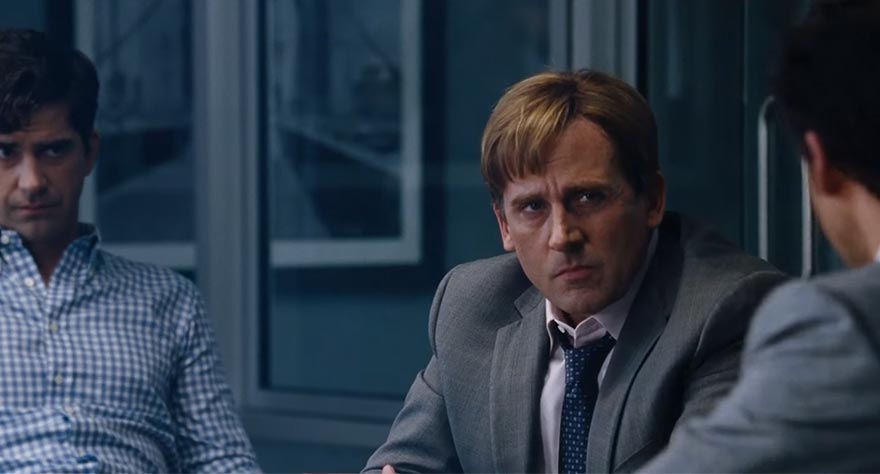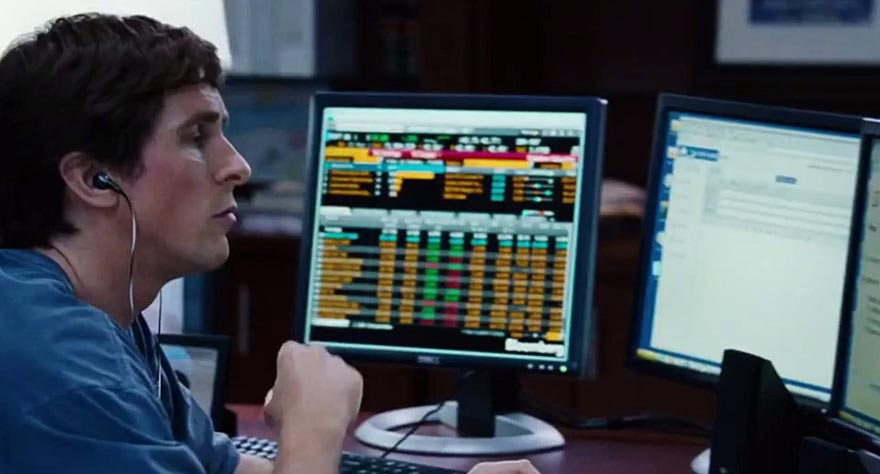
Funny and infuriating, Adam McKay's portrayal of the housing market collapse is a sharp shaming of those involved.

Funny and infuriating, Adam McKay's portrayal of the housing market collapse is a sharp shaming of those involved.
2015 is wrapping up and looking back on the year there have been a fair amount of films that have been emotionally provoking, but The Big Short is in many ways at least equal to Mad Max in blood-pressure-raising cogency. The nearness of so recent a catastrophe combined with Adam McKay’s blended fact-driven drama and absurd-because-it’s-true comedy, ensures a righteous resentment. The film moves quickly introducing a lot of people and breaking the fourth wall often to explain terminology and provide a high level of self-awareness as characters explain when the film is being truthful and when it’s taking liberties for the sake of moviemaking. This candid storytelling builds a level of trust that feels akin to watching a documentary. The roller coaster ride of not being sure when to laugh at the preposterousness and scope of the events unfolding, or when to cry whenever the realization of their truthfulness sinks in, by far makes for one of the most peerless filmgoing experiences of the year.
Based on Michael Lewis’s bestselling nonfiction book of the same name, the focus of this expose is on the unlikely people who not only predicted the collapse (or bursting, if you will) of the credit and housing bubble that led to the crisis of 2008 and contributed greatly to the longest recession in U.S. history, but who also profited greatly when it happened. There’s the awkward Asperger’s-savant hedge fund investor, Dr. Michael Burry played by Christian Bale, who crunches the numbers and predicts the future, pretty much to the month the collapse will happen. He starts investing his clients’ money, betting against the banks, who happily take it thinking such a thing could never happen. His clients are understandably unhappy with the risk.
Word spreads of his crazy actions and soon Wall Street banker Jared Vennett (Ryan Gosling doing what he does best, faking a New York accent and being as shmarmy as can be) catches wind and wants in on the potentially huge earnings involved, he manages to enlist outspoken hedge fund manager Mark Baum (Steve Carell) and his team. Baum operates under the umbrella of Morgan Stanley but actively despises the practices of big banks. After doing his research—part of which hilariously involves interviewing strippers on their financial practices in Florida—Baum realizes the truth of the housing bubble and invests. The remaining morally ambiguous underdogs are small timers Jamie Shipley (Finn Wittrock) and Charlie Geller (John Magaro) who started an investment firm out of their garage and are looking to get into the big leagues, without any clout they have to get retired investor Ben Rickert (Brad Pitt) to do the deals for them. He also agrees out of spite for corporate America and the rest of the film is watching the wool unravel as the banking world parties and denies that anything bad—at least, related to mortgages—could ever happen to them.

It would be easy to focus on the moral ambiguity of the individual men who gained from America’s huge downfall, but the spotlight of The Big Short can’t help but fall on the banks and governmental entities who tried (and in almost every way succeeded) to deny their fraud and negligence. McKay highlights the deceptive nature of the industry even as he pokes fun at it. For instance, the complicated lingo of the banking industry, while possibly useful to those on the inside, is beyond confusing to the layperson, especially when reduced to acronyms. McKay brings in celebrities playing themselves to break down these terms and provide visual explanations. Anthony Bourdain, Selena Gomez, and a naked Margot Robbie explaining terms like “CDO” and “subprime mortgage rates” is as entertaining as it is informative. That said, a film like this would require multiple viewings to fully grasp the full extent of the economic and fiscal theory playing out and the sheer mathematics that explain all that happened. But this isn’t a documentary, and it’s not meant to be viewed as such.
McKay seems to respect that viewers know how this story ends and that as wrapped up as we get in the characters’ schemes to make it rich off of the evil banks, rooting for them is, in fact, rooting for the failure, financial ruin and catastrophic misfortune of the American people. Any criticism of the film would have to be that very little time is spent focusing on what that misfortune looked like for people. Only one shot depicts a family, met earlier in the film, now homeless and living out of a van. But this seems a smart move as the point isn’t to focus on the sadness invoked by such imagery, but instead to hang on to the infuriation that bubbles up as the full extent of awareness and collusion of the banks and the government is revealed. It’s an unprecedented circumstance in American history and the film spells out just how few consequences there were for those responsible.
The star power of the film is overwhelming, even with Pitt providing the least amount of screen time. Carell is the most impressive, proving once again he has depths barely yet tapped. He brings to Baum all the social disregard of The Office’s Michael Scott with the intensity of Foxcatcher’s John du Pont and adding a moral anger that ties it all together amazingly. Christian Bale—never one to go halfway on any character—combines aloofness with the burden of genius to make his detached character perhaps the most sympathy-inspiring. But the real star is by far the director, who almost retroactively makes his comedies like Talladega Nights and Step Brothers seem even more astute now that we’ve been given such a clear example of how deftly he can comically reflect on true-life drama.
It’s easy to dismiss the complicated mess of the housing crises and collapse, shaking our heads at the math and economic intricacy, and McKay seems to know that his film isn’t going to incite retroactive punishment or propel a revolution. The significance of a film like The Big Short isn’t just a much-needed reminder that we the people should always take the time to understand and reflect on how hardships like this occur, but that comedy is a sharp weapon in shaming those who deserve to be called out.